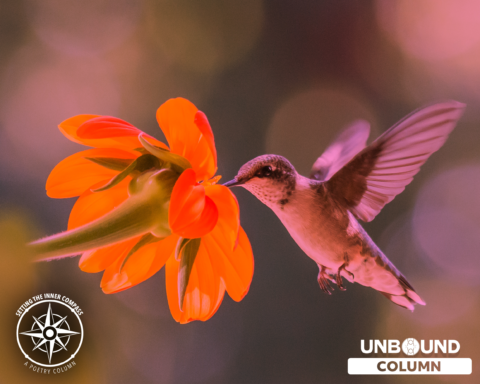Reading poetry is one of the ways some of us nourish our faith, a way we set or reset our inner compass and stay focused on the big picture, on the spiritual journey. This monthly column, ‘Setting the Inner Compass’ is intended to share poems that nourish the soul. All of the poems resonate on their own. Sometimes, I’ll put poems together because they share a common theme.
In his book, Concern for the Church, Jesuit theologian Karl Rahner offered this memorable and well-known quote, “the Christian of the future will be a mystic or will not exist at all.” It is a bold claim. I believe that mysticism is an essential component of the future of Christian faith alongside social justice activism, theological reflection, and interfaith understanding. By mysticism I mean an openness to an experience of The Sacred/The Holy/God. Dorothy Day writes of one such mystical experience in prison. Howard Thurman, who was called the mystic of the civil rights movement, engaged in contemplative practice. He believed it was important to have experiences of God, which could be found within one’s self or in conversation with nature.
Thomas Merton was a mystic who wrote about a mystical experience in Louisville, not far from the PCUSA offices. It is found in his book, Conjectures of an Guilty Bystander:
“In Louisville, at the corner of Fourth and Walnut, in the center of the shopping district I was suddenly overwhelmed with the realization that I loved all those people, that they were mine and I theirs, that we could not be alien to one another even though we were total strangers. It was like waking from a dream of separateness, of spurious self-isolation in a special world, the world of renunciation and supposed holiness… This sense of liberation from an illusory difference was such a relief and such a joy to me that I almost laughed out loud… There is no way of telling people that they are all walking around shining like the sun.”
There are poems about mystical experience and poems that invite us into those experiences. I share two poems in this column and suggest two others: “We are a Tribe” by Alberto Rios and “Feather at Midday” by Sr. Dang Ngheim.
Peace,
Dave
The Poems
“A Blessing” is based on an experience James Wright had while driving home one late afternoon with his friend Robert Bly.
“A Blessing” by James Wright
Just off the highway to Rochester, Minnesota,
Twilight bounds softly forth on the grass.
And the eyes of those two Indian ponies
Darken with kindness.
They have come gladly out of the willows
To welcome my friend and me.
We step over the barbed wire into the pasture
Where they have been grazing all day, alone.
They ripple tensely, they can hardly contain their happiness
That we have come.
They bow shyly as wet swans. They love each other.
There is no loneliness like theirs.
At home once more,
They begin munching the young tufts of spring in the darkness.
I would like to hold the slenderer one in my arms,
For she has walked over to me
And nuzzled my left hand.
She is black and white,
Her mane falls wild on her forehead,
And the light breeze moves me to caress her long ear
That is delicate as the skin over a girl’s wrist.
Suddenly I realize
That if I stepped out of my body I would break
Into blossom.
from VACILLATION by William Butler Yeats
IV
My fiftieth year had come and gone,
I sat, a solitary man,
In a crowded London shop,
An open book and empty cup
On the marble table-top.
While on the shop and street I gazed
My body of a sudden blazed;
And twenty minutes more or less
It seemed, so great my happiness,
That I was blessed and could bless.
“A Blessing” is from Collected Poems © 1971 by James Wright. Published by Wesleyan University Press. Reprinted with permission.
from Vacillation: IV by William Butler Yeats is from The Collected Works of WB Yeats, Volume 1: the poems. © 1933 The MacMillan Company.
The Thomas Merton quote is from, Conjectures of a Guilty Bystander by Thomas Merton and was first published in 1966 by Doubleday Image Books.
“We are a Tribe” by Alberto Rios is from his book Goodbye Mexico: Poems of Remembrance published in 2014 by the Texas Review Press.
“Feather at Mid-day” is by Sister Dang Nghiem from her book, A Woman’s Journey from Doctor to Nun published in 2010 by Parallax Press.
Rev. Dave Brown is the creator/host of Blues Vespers and a member of the PCUSA Public Education Roundtable. Dave along with Rabbi Ted Falcon and Imam Jamal Rahman offer programs about interfaith in the Pacific Northwest as the PNW Interfaith Amigos. He is the former pastor of Immanuel Presbyterian Church, Tacoma.






Unbound Social